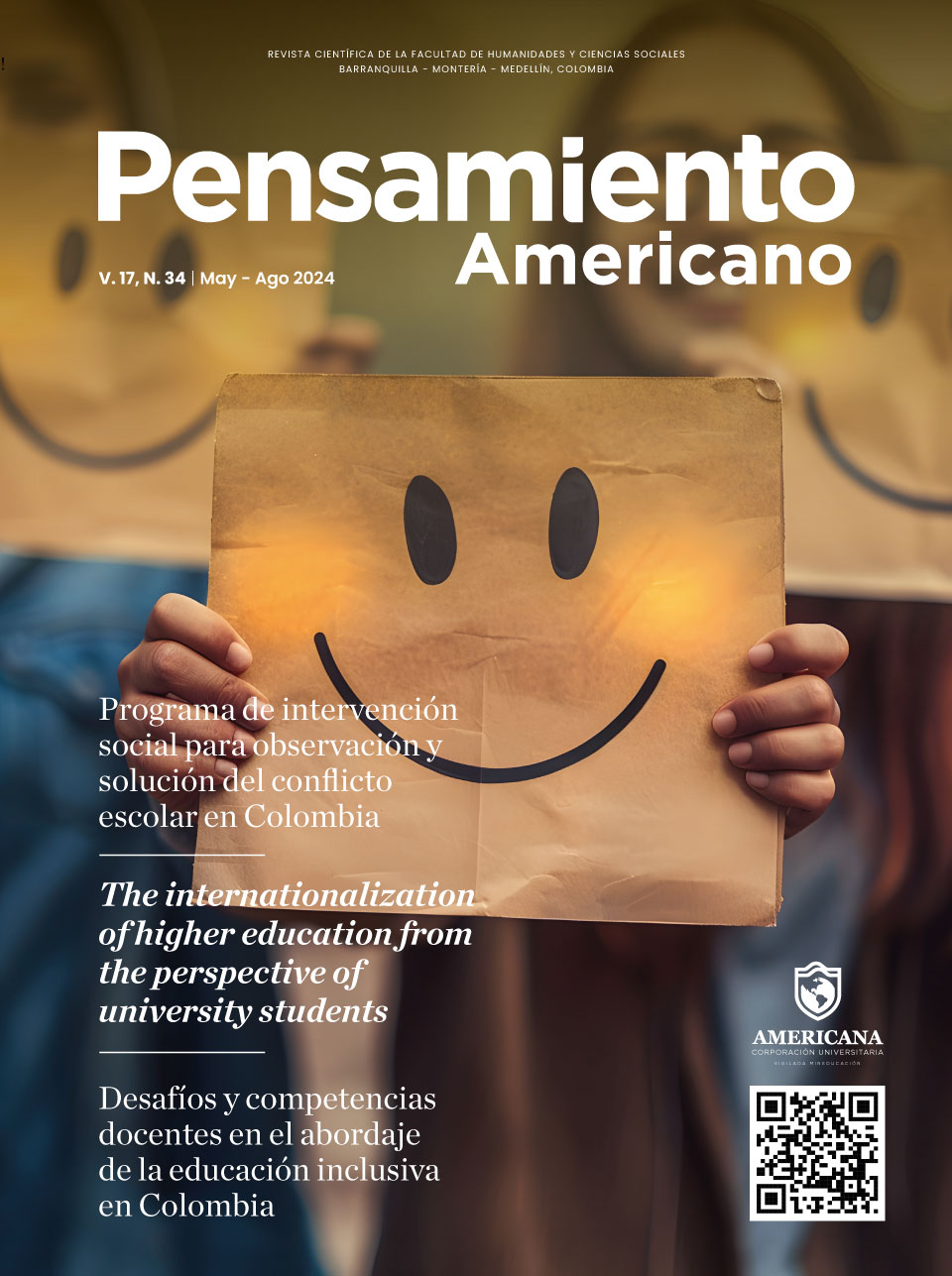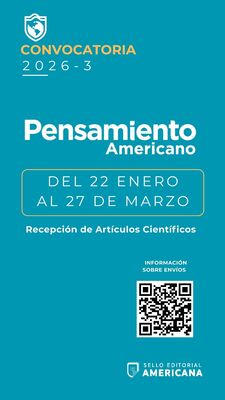Theoretical and conceptual principles for realizing Universal Access to Knowledge in Mexico
DOI:
https://doi.org/10.21803/penamer.17.34.700Keywords:
Universal Access to Knowledge, Scientific Dissemination , Open AccessAbstract
Introduction: Universal Access to Knowledge (AUC) is a recently promoted term by the National Council of Humanities, Sciences and Technologies (CONAHCYT) of Mexico, but there is no clear guide to realise it. Therefore, there is a need for an AUC model with best practices for the expansion of science in society. Objective: to present in a clear and concrete way a set of theoretical, conceptual and procedural principles that are useful to carry out AUC in the Mexican context. To this end, it is necessary to describe that scientific communication is divided into two main categories: dissemination, which presents findings from the scientific field among specialists, and popularisation, which shares science with the general public. The AUC is an emerging science outreach strategy that is governed by principles of open access and horizontal communication to promote interest in science among all people. Reflection: In such a way that, this proposal is headed by the mentioned concepts and the fundamentals of graphic and audiovisual design are added to better face the challenge of making AUC. This open and horizontal approach to communicate science to the non-specialist public will be useful to define what Universal Access to Knowledge is and how to carry it out, as well as to consolidate the scientific community as a key part of society and to boost the interest of children and young people in scientific research.
Downloads
References
Bernardino, S., Moctezuma, P., y Mungaray, A. (2018). Cimarrones de la ciencia y la tecnología. Una exitosa experiencia mexicana de divulgación científica. Interciencia Revista de Ciencia y Tecnología de las Américas, 43(9), 619–629. https://www.interciencia.net/wp-content/uploads/2018/09/619-LOPEZ-43-09.pdf
Briones, C. (2020). La horizontalidad como horizonte de trabajo. En I. Cornejo & M. Rufer (Eds.), Horizontalidad. Hacia una crítica de la metodología (1a ed., pp. 59–92). CLACSO. http://biblioteca.clacso.edu.ar/clacso/se/20201023034518/Horizontalidad.pdf
CONAHCYT. (2023). Acceso Universal al Conocimiento. https://conahcyt.mx/acceso-universal-al-conocimiento/
Conopoima, Y., Ferreira, G., Baque, F., y Álvarez, G. (2021). Las píldoras educativas: colección de herramientas automatizadas para su desarrollo. Revista Metropolitana de Ciencias Aplicadas, 4(1), 89–98. https://remca.umet.edu.ec/index.php/REMCA/article/view/352/372
Corona, S. (2020). Producción horizontal del conocimiento (1a ed.). Bielefeld University Press. https://doi.org/10.14361/9783839449745
Corona, S., y Kaltmeier, O. (2012). En diálogo. Metodologías horizontales en Ciencias Sociales y Culturales (1a ed.). Editorial Gedisa.
de Leo, M. (2023). Curso Acceso Universal al Conocimiento. Comunicación del Conocimiento UAM. https://www.facebook.com/ConocimientoUAM/videos/6615738428443335
Forero, M., Moreno, L., Bernal, J., Torres, J., y Martínez, A. (2022). Los subtítulos integrados deícticos favorecen la comprensión oral en el aprendizaje de francés como lengua extranjera cuando se usan en material didáctico audiovisual. Colombian Applied Linguistics Journal, 24(2). https://doi.org/10.14483/22487085.18070
Garza-Almanza, V. (2016). Periodismo científico en México. CULCYT. Cultura Científica y Tecnológica, 18, 4–12. https://erevistas.uacj.mx/ojs/index.php/culcyt/article/view/1082
Gómez, G. (2020). Diseño, tipografía y comunicación visual. Ahora todo vale (pp. 83–100). Universidad de Palermo. https://doi.org/10.18682/cdc.vi120.4175
Morandeira, A., Riquelme, J., Álvarez, M., Targarona, E., y Moreno, C. (2019). Uso de las redes sociales por parte de los cirujanos generales. Resultados de la encuesta nacional de la Asociación Española de Cirujanos. Cirugía Española, 97(1), 11–19. https://doi.org/10.1016/j.ciresp.2018.07.001
Morgado, P., y Fernández-Silva, S. (2020). Incidencia de las metáforas en la comprensión de textos divulgativos del área de Biología. Logos Revista de Lingüística, Filosofía y Literatura, 31(1). https://doi.org/10.15443/RL3104
Ramírez, D., Martínez, L., Castellanos, O., y Colmenares, W. (2016). Divulgación y difusión del conocimiento: las revistas científicas. (2a ed.). Editorial Universidad Nacional de Colombia. https://www.researchgate.net/publication/303447322_Divulgacion_y_difusion_del_conocimiento_las_revistas_cientificas
Tenorio, G., Martínez, M., y Soberanes, A. (2019). Repositorios de acceso abierto en las instituciones de educación superior en México. Información, cultura y sociedad, 40, 117–130. https://doi.org/10.34096/ics.i40.5317
Wong, W. (2008). Principios del diseño en color. Editorial Gustavo Gilli. https://editorialgg.com.mx/principios-del-dise-o-en-color-ebook.html
Wong, W. (2011). Fundamentos del Diseño bi- y tri-dimencional. Gustavo Gili. https://ggili.com/fundamentos-del-dise-o-libro.html
Downloads
Published
Versions
- 2024-09-09 (3)
- 2024-08-01 (2)
Issue
Section
License
Copyright (c) 2024 Pensamiento Americano

This work is licensed under a Creative Commons Attribution-NonCommercial-NoDerivatives 4.0 International License.
The author or authors of an article accepted for publication in the Journal Pensamiento Americano will transfer all of the patrimonial rights to the American University Corporation free of charge, within which are included: the right to edit, publish, reproduce and distribute both print media as digital, in addition to include in article in international indexes and / or databases, likewise, the Editorial Seal is authorized to use the images, tables and / or any graphic material presented in the article for the design of covers or posters from the same magazine. By assuming the patrimonial rights of the article, it may not be partially or totally reproduced in any printed or digital media without its express permission.
AUTHORITY ASPECTS
For the Pensamiento Americano Journal, all the authors of an article have made substantial contributions to the research and the manuscript, and they share the responsibility when the article presents errors, fraud in some way or violations of copyright.
After submitting an article, the journal does not accept the addition, deletion or change in the order of the authors, in addition we reserve the right to release the article when it has been submitted to the journal and under no circumstances will American Thought accept the article. withdrawal of an article during any phase of the editorial process





